
Molecular & Cellular Toxicology
metrics 2024
Advancing the understanding of toxicological impacts at the cellular level.
Introduction
Molecular & Cellular Toxicology, published by the Korean Society Toxicogenomics & Toxicoproteomics (KSTT), is a significant journal in the field of toxicology, providing crucial insights into molecular mechanisms underlying toxic responses. With an ISSN of 1738-642X and E-ISSN 2092-8467, this journal serves as a vital platform for researchers, professionals, and students interested in the latest findings and advancements in toxicology, health, and environmental science. Although it operates under a subscription model, it maintains rigorous peer review standards, contributing to its respectable Q3 classification in Health, Toxicology and Mutagenesis, and its Q2 standing in Pharmacology, Toxicology, and Pharmaceutics. The journal, intersecting with innovative aspects of pharmacology and public health, aims to foster a deeper understanding of toxicological impacts on cellular processes and overall health. Located in Germany and supported by a dedicated editorial board, Molecular & Cellular Toxicology stands out in the academic community, encouraging interdisciplinary discourse and collaboration to address critical toxicological challenges. Engage with us for cutting-edge research that informs and shapes the future of toxicological science.
Metrics 2024
 0.37
0.37 1.10
1.10 1.10
1.10 28
28Metrics History
Rank 2024
Scopus
IF (Web Of Science)
JCI (Web Of Science)
Quartile History
Similar Journals

IMMUNOPHARMACOLOGY AND IMMUNOTOXICOLOGY
Exploring the Nexus of Immunology and Drug SafetyImmunopharmacology and Immunotoxicology, published by Taylor & Francis Ltd, is a distinguished academic journal with a focus on the interrelation between pharmacology, immunology, and toxicology. Established in 1978, the journal serves as a vital platform for the dissemination of cutting-edge research aimed at enhancing the understanding of immunologically mediated drug responses and toxic effects. The journal encompasses a broad scope of topics relevant to the fields of immunology, pharmacology, and toxicology, offering insights that are pivotal for both academia and the pharmaceutical industry. With a commendable 2023 impact factor and ranking in Q3 in Immunology and Q2 in both Pharmacology and Toxicology, it holds a respected position within its categories, making it a valuable resource for researchers, professionals, and students seeking to stay abreast of the latest developments in the field. The journal is accessible through traditional subscription models and encourages submissions that bring forth innovative findings that might influence therapeutic strategies and public health.
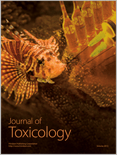
Journal of Toxicology
Exploring the impacts of toxic substances on life.Journal of Toxicology, published by HINDAWI LTD, stands as a pivotal open-access journal in the fields of toxicology and pharmacology since its inception in 2009. With an ISSN of 1687-8191 and an E-ISSN of 1687-8205, this journal is dedicated to disseminating high-quality research that critically examines the effects of toxic substances on living organisms. Located in Egypt and operating from their London office, it aims to provide an extensive platform for researchers worldwide to share findings that can inform better practices in safety and regulation. As of 2023, it has achieved significant recognition, holding a Q3 ranking in both the pharmacology and toxicology categories, and is indexed in Scopus with noteworthy percentile rankings (Toxicology: 57th and Pharmacology: 55th). With a focus on innovative studies and emerging areas such as environmental toxicology, biomarker research, and therapeutic interventions, the Journal of Toxicology invites both experienced researchers and students to contribute, thereby enhancing the breadth and depth of toxicological knowledge for the global scientific community.

Toxicology Research
Advancing toxicology for a safer tomorrow.Toxicology Research is a distinguished journal dedicated to advancing the field of toxicology through the dissemination of high-quality research. Published by Oxford University Press, this UK-based journal focuses on critical aspects of toxicology and mutagenesis, highlighting both environmental and pharmacological implications. With an ISSN of 2045-452X and an E-ISSN of 2045-4538, it serves as a valuable resource for researchers, professionals, and students alike. Currently categorized in the Q3 quartile for Health, Toxicology and Mutagenesis, as well as Toxicology in 2023, Toxicology Research maintains a visible presence in Scopus rankings, positioning itself within the targeted professional community. Although the journal operates without open access options, its importance in contributing to scientific discussions and policy formation is undeniable. Covering content from 2012 to 2024, it continues to provide insights into contemporary toxicological challenges, thereby fostering interdisciplinary collaborations and informing best practices in health and safety.
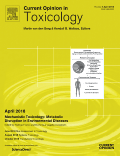
Current Opinion in Toxicology
Connecting Researchers to the Pulse of ToxicologyCurrent Opinion in Toxicology is a premier academic journal published by Elsevier, focusing on the latest advancements and perspectives in the field of toxicology. With an impressive impact factor reflecting its high citation and influence within the research community, this journal ranks in the Q1 category for Toxicology, positioned at #8 out of 133 in the Scopus Toxicology domain, placing it in the 94th percentile. The journal aims to provide concise and insightful reviews of contemporary research, fostering an understanding of critical issues related to toxic effects of chemicals and environmental agents. Although not an open access journal, it attracts a worldwide readership, making it an essential resource for researchers, professionals, and students committed to understanding toxicological science. Based in the Netherlands, Current Opinion in Toxicology serves as a platform for stimulating scholarly dialogue and guiding future research directions in this vital area of study.
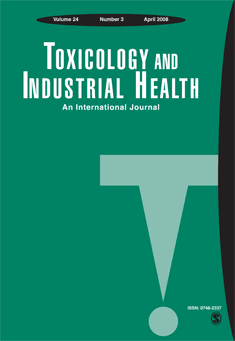
TOXICOLOGY AND INDUSTRIAL HEALTH
Advancing knowledge in toxicology for a safer industrial future.TOXICOLOGY AND INDUSTRIAL HEALTH, published by SAGE PUBLICATIONS INC, is a premier journal in the field of toxicology, public health, and environmental health, with a significant history dating back to 1985. With its ISSN 0748-2337 and E-ISSN 1477-0393, the journal provides a platform for disseminating groundbreaking research and comprehensive reviews that address the complexities of toxic substances in industrial and occupational settings. Despite its Q3 ranking among peers in health, toxicology, and public health, this journal is becoming increasingly influential, reflected in its growing citation metrics. Researchers and professionals benefit from its commitment to fostering knowledge in both theoretical and practical contexts, making it an essential resource for those dedicated to advancing understanding in this vital field. The journal's main objectives include promoting research addressing the implications of toxicology on health and safety standards across industries, ensuring accessibility to current studies for a global audience. Overall, TOXICOLOGY AND INDUSTRIAL HEALTH plays a critical role in bridging the gap between research and real-world applications, proving invaluable to students, professionals, and researchers alike in their pursuit of enhancing public health and environmental safety.
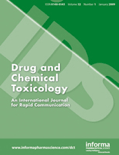
DRUG AND CHEMICAL TOXICOLOGY
Championing interdisciplinary research in toxicology.Drug and Chemical Toxicology is a well-respected journal in the fields of toxicology, pharmacology, and public health, published by Taylor & Francis Ltd. Since its inception in 1978, this journal has diligently explored the effects and mechanisms of chemical exposures on health and the environment, fulfilling a crucial role in advancing scientific understanding and safeguarding public health. The journal is indexed across prestigious databases and features an impressive array of articles categorized within the Q2 and Q3 quartiles across various categories in 2023, reflecting its significance in Chemical Health and Safety as well as Environmental and Occupational Health disciplines. With an extensive reach and a focus on interdisciplinary research, Drug and Chemical Toxicology offers a rich repository of original research, reviews, and methodological advancements, catering to a diverse audience of researchers, professionals, and students dedicated to the betterment of safety and health standards. Although not an open-access publication, its articles are widely accessible to the academic community, ensuring that critical innovations and insights are shared for the greater good.
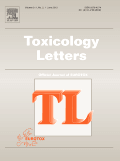
TOXICOLOGY LETTERS
Unveiling the impacts of substances on health and environment.TOXICOLOGY LETTERS is a prominent journal dedicated to advancing the field of toxicology, providing a platform for high-quality research and reviews that explore the effects of chemical substances on biological systems. Published by Elsevier Ireland Ltd, this peer-reviewed journal has established itself as a vital resource in toxicological research since its inception in 1977, with a convergence of studies extending to 2024. With an impressive Scopus ranking, positioned at #28 out of 133 in the Toxicology category, TOXICOLOGY LETTERS garners a respectable percentile of 79, highlighting its significance in the academic community. Although it is not an open-access journal, its research is accessible through institutional subscriptions, ensuring that critical insights into human health and environmental safety are disseminated effectively. Being categorized in the Q2 quartile in both Medicine (miscellaneous) and Toxicology for 2023 further emphasizes its relevance and impact in these fields. This journal aims to foster collaboration between researchers and professionals, encouraging the exploration of innovative solutions to chemical hazards and the promotion of safer practices in pharmacology and toxicology.

International Journal of Medical Toxicology and Forensic Medicine
Bridging Research and Practice in Medical ToxicologyInternational Journal of Medical Toxicology and Forensic Medicine, published by Shaheed Beheshti Medical University of Medical Sciences & Health Services, is a pioneering platform dedicated to advancing knowledge within the critical fields of toxicology and forensic medicine. Established as an Open Access journal since 2011, it ensures wide dissemination of research findings, catering to a global audience of researchers, healthcare professionals, and students. With an ISSN of 2251-8762 and an E-ISSN of 2251-8770, the journal covers a diverse range of topics relevant to the medical community, albeit being categorized as Q4 in both Pathology and Forensic Medicine and Toxicology in 2023, indicating emerging significance in these disciplines. Geographically based in Tehran, Iran, it aspires to bridge gaps in scientific research and practice, particularly in regions where such expertise is critical. The journal welcomes submissions that investigate pressing issues in medical toxicology and forensic science, fostering an interdisciplinary dialogue essential for innovative solutions and improved public health outcomes.

TOXICOLOGY AND APPLIED PHARMACOLOGY
Exploring the Interplay of Drugs and ToxicityTOXICOLOGY AND APPLIED PHARMACOLOGY, published by Academic Press, Inc. Elsevier Science, stands as a leading journal in the domains of toxicology and pharmacology, with its establishment dating back to 1959. With an impact factor reflecting its academic rigor and relevance, this journal is classified in the Q2 quartile for both pharmacology and toxicology categories, underscoring its significance in the scientific community. It ranks #34 out of 133 in Toxicology and #95 out of 313 in Pharmacology according to Scopus, placing it within the 74th and 69th percentiles, respectively. The journal aims to disseminate quality research that drives advancements in understanding the interactions of drugs and toxic substances within biological systems. Researchers and professionals are invited to contribute and engage with a broad spectrum of articles that cover mechanistic studies, risk assessment, and innovative therapeutic strategies. Although the journal does not offer open access, it continues to be a crucial resource for those who seek to navigate the complex interface of drugs and their toxicological implications.
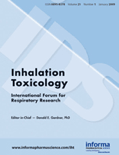
INHALATION TOXICOLOGY
Advancing the Science of Airborne Hazards.Inhalation Toxicology, published by Taylor & Francis Ltd, is a premier journal dedicated to advancing the field of toxicology with a particular focus on inhalation exposure and its impact on human health. Established in 1989, this journal provides a vital platform for original research, reviews, and case studies that explore the toxicological effects of inhaled substances, making it essential reading for researchers, health professionals, and regulatory scientists. With an Impact Factor that situates it in the Q3 category in both Health, Toxicology and Mutagenesis, the journal asserts its relevance within the scientific community, particularly emphasizing its contributions as indexed by Scopus rankings in related fields. Although it follows a traditional access model, the journal's commitment to delivering high-quality research continues to foster significant discussions and advancements in understanding inhalation toxicology. For those at the forefront of environmental science and pharmacology, Inhalation Toxicology is an indispensable resource for both current research and future innovations in the discipline.